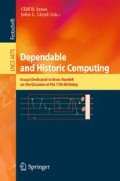Abstract
I outline the principal ideas of the Distributed Secure System (DSS) on which Brian Randell and I collaborated in the early 1980s, its modern manifestation as MILS, and continuing research challenges posed by these architectures.
This work was supported by National Science Foundation Grant CNS-0720908.
Access this chapter
Tax calculation will be finalised at checkout
Purchases are for personal use only
Preview
Unable to display preview. Download preview PDF.
References
Randell, B., Rushby, J.: Distributed secure systems: Then and now. In: Proceedings of the Twenty-Third Annual Computer Security Applications Conference, Miami Beach, FL, pp. 177–198. IEEE Computer Society, Los Alamitos (2007) Invited “Classic Paper” presentation
Brownbridge, D.R., Marshall, L.F., Randell, B.: The Newcastle Connection, or UNIXes of the world unite! Software—Practice and Experience 12, 1147–1162 (1982)
Boettcher, C., DeLong, R., Rushby, J., Sifre, W.: The MILS component integration approach to secure information sharing. In: 27th AIAA/IEEE Digital Avionics Systems Conference, St. Paul, MN, The Institute of Electrical and Electronics Engineers (2008)
Rushby, J.: The design and verification of secure systems. In: Eighth ACM Symposium on Operating System Principles, Asilomar, CA, pp. 12–21 (1981); ACM Operating Systems Review 15(5)
Rushby, J.: Noninterference, transitivity, and channel-control security policies. Technical Report SRI-CSL-92-2, Computer Science Laboratory, SRI International, Menlo Park, CA (1992)
Haigh, J.T., Young, W.D.: Extending the noninterference version of MLS for SAT. IEEE Transactions on Software Engineering SE-13, 141–150 (1987)
van der Meyden, R.: What, Indeed, is Intransitive Noninterference (Extended Abstract). In: Biskup, J., López, J. (eds.) ESORICS 2007. LNCS, vol. 4734, pp. 235–250. Springer, Heidelberg (2007)
Chong, S., van der Meyden, R.: Using architecture to reason about information security. Technical report, University of New South Wales (2009)
Dobson, J., Randell, B.: Building reliable secure computing systems out of unreliable insecure components. In: Proceedings of the Seventeenth Annual Computer Security Applications Conference, New Orleans, LA, pp. 162–173. IEEE Computer Society, Los Alamitos (2001) Invited “Classic Paper” presentation
Author information
Authors and Affiliations
Editor information
Editors and Affiliations
Rights and permissions
Copyright information
© 2011 Springer-Verlag Berlin Heidelberg
About this chapter
Cite this chapter
Rushby, J. (2011). From DSS to MILS. In: Jones, C.B., Lloyd, J.L. (eds) Dependable and Historic Computing. Lecture Notes in Computer Science, vol 6875. Springer, Berlin, Heidelberg. https://doi.org/10.1007/978-3-642-24541-1_6
Download citation
DOI: https://doi.org/10.1007/978-3-642-24541-1_6
Publisher Name: Springer, Berlin, Heidelberg
Print ISBN: 978-3-642-24540-4
Online ISBN: 978-3-642-24541-1
eBook Packages: Computer ScienceComputer Science (R0)

